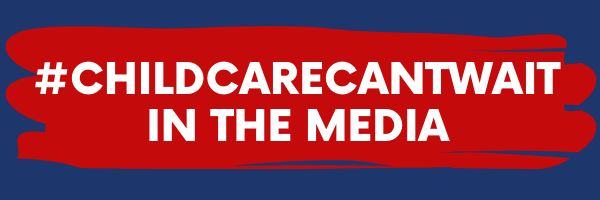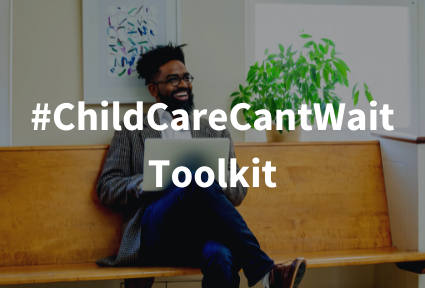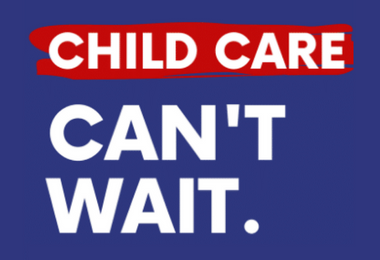Tell Congress Child Care Can’t Wait
The existing structure of America’s child care system is unsustainable. Most parents can’t afford the high cost of child care. Half of Americans live in an area without quality care options at all. And providers can only charge what families in their area can afford, which often translates into near-poverty wages for early educators.
UPDATE (August 2022): Child care and early learning were cut from the reconciliation package (now known as the Inflation Reduction Act). This setback means we can’t stop lifting our voices. Now is the time for Congress to address America’s child care crisis with a significant, sustained investment in our early education system to ensure every family who needs it can access the care options that work for them.
Read our full statement on the Inflation Reduction Act.
HERE’S HOW YOU CAN HELP:
Contact your U.S. Senators and Representative
Contact your U.S. Senators and Representative to let them know that the lack of inclusion of child care investments in reconciliation will have devastating consequences on Georgia’s children, families, early educators, and economy.
Share your story
Share your story to strengthen our advocacy efforts as we work to capitalize on this once-in-a-generation opportunity.
Use Our Toolkit
Use our #ChildCareCantWait Toolkit to raise awareness about the importance of early learning and policies that support young children, families, and the early childhood workforce.
Request Free Promotional Items
Want to take your advocacy to the next level? Request FREE #ChildCareCantWait promotional items, such as posters, buttons, and stickers.
- Now more than ever, support for early childhood education (ECE) among Georgia voters is consistently strong and overwhelmingly bipartisan. According to a March 2022 poll by First Five Years Fund, 85% of Georgians say that child care and early learning programs are a good investment of taxpayers’ money. Even 78% of those who say federal spending is too high believe child care to be a good investment.
- Child care and early learning remain one of the biggest expenses working families face. Families across Georgia struggle to afford child care, with the average yearly infant tuition costing more than in-state tuition at a four-year public college.
- It has never been more clear that child care is crucial to many parents’ ability to work and, therefore, our economy. 34% of Georgia parents with young children said they or someone in their family had to quit a job, not take a job, or greatly change a job in the past 12 months due to problems with child care, up from 26% in 2018.
- Early educators make significantly less than their counterparts in similar professions and are among the lowest-paid workers in every state making an average hourly wage of only $10.72 nationally. Low pay has always been a problem for the child care industry, leading to high staff turnover and lower program quality. Many child care programs across Georgia are struggling with staffing shortages, with some having to keep classrooms closed due to staffing shortages despite demand.
- The earliest years of life are when the vast majority of a child’s brain development occurs, and when the foundation is laid for the social, emotional, and cognitive skills that will be with them for the rest of their lives. Yet for too many families, high-quality child care and preschool options are out of reach, leaving many parents to rely on inconsistent, unsafe options or with no options at all.

- Georgia Needs Universal Preschool to Stay Competitive, Education And Policy Experts Say, Georgia Public Broadcasting (7-30-21)
- Families Continue to Struggle with Childcare Availability, Affordability, Reporter Newspapers (8-3-21)
- Metro Atlanta daycare centers struggle to find workers, 11 Alive (7-6-21)
- New report on early childhood: COVID is both historic crisis and opportunity, Atlanta Journal-Constitution (6-21-21)
- ‘Can’t Compete’: Why Hiring for Child Care Is a Huge Struggle, New York Times (9-21-21)
- Families continue to struggle with childcare availability, affordability, Reporter Newspapers (8-3-21)
- Why is pre-K not free and what does President Biden want to do to the program?, 11 Alive (8-11-21)
- Staffing shortages, low pay contribute to daycare dilemma in metro Atlanta, CBS 46 (11-11-21)




